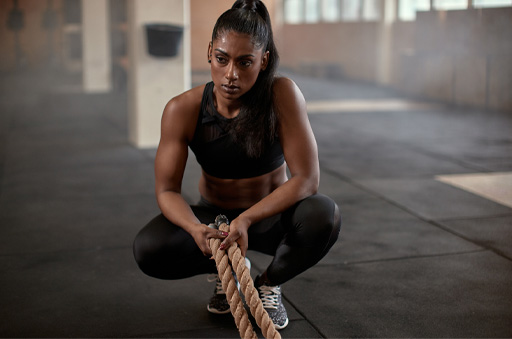2 Why might athletes take hormonal contraceptives?
The 2020 BBC Elite British Sportswomen’s Survey [Tip: hold Ctrl and click a link to open it in a new tab. (Hide tip)] showed that almost 1 in 3 (28%) athletes took a contraceptive pill with the belief that it controls the impact that their period has on their performance. Avoiding pregnancy was the original reason that hormonal contraceptives were developed, but now they are commonly used for other reasons as well. One of these reasons is menstrual management. This and other reasons are discussed in Activity 2.
Activity 2 Menstrual management and other reasons
In the video Dr Emma Ross, outlines the reasons that hormonal contraceptives are used and some of the side effects they can have. Watch the video, then answer the following question:
- If you are an athlete, why do you use hormonal contraceptives or if you support an athlete why do you think athletes use hormonal contraceptives?

Transcript
Discussion
As you have heard hormonal contraceptives are taken for a variety of reasons, including their intended purpose. They are also used to make their cycle more predictable and manage symptoms of the menstrual cycle, such as heavy bleeding and severe period pain. However, often active women may use them for menstrual management. The menstrual cycle can be manipulated for the convenience of sport so an athlete does not experience menstrual symptoms, or can predict when they will bleed, which makes managing their cycle around a big event or competition easier.
While menstrual management can be important and effective for athletes, it is also important that women are aware of the potential impact hormonal contraception may have on their performance, physically and psychologically, and to be vigilant for any unwanted side effects such as unwanted weight gain and low mood. There is not a one-size-fits-all best hormonal contraception choice for athletes, and it may take more than one attempt to find what suits them best. Monitoring physical and emotional symptoms when athletes start using hormonal contraception can be a useful way to understand which side effects may be present, and if and how, they impact training and performance.
Hormonal contraceptives have historically been used to treat loss of periods (amenorrhoea) due to disruption of the menstrual cycle. However, this approach actually masks the root cause of menstrual dysfunction, since the re-instigation of a withdrawal bleed is not the same as normal menstruation, yet it can lead athletes to falsely believe that their cycle has been resumed (Elliott-Sale and Hicks, 2019). Hormonal contraceptives will mask the root cause of menstrual dysfunction. It is important to understand what is causing irregular or absent periods and work on restoring a healthy cycle, before considering the use of hormonal contraceptives.

